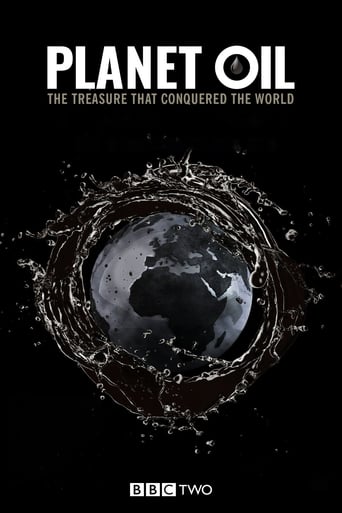jeffinbath
This was a good informative documentary with an intriguing perspective presented with Ian Stewart's inimitable enthusiasm. The criticism that a bit more could have been said about the process of transforming sea life to oil over geological time was not unreasonable. Nor was it unreasonable to point out that the great London smog of 1952 had little to do with the lack of oil use. However it certainly was to do with the ubiquitous burning of coal in Victorian style home coal fires. It led to the banning of ordinary coal burning and the adoption of smokeless fuel zones using coke or coal "brickettes" and encouraged central heating using oil or gas. I remember well the massive coke mounds outside the Battersea Power station with all 4 chimneys belching away. That coke was of course the product from extracting coal gas from massive amounts of coal to fill hundreds of those large "gasometers" all over the country. However as I understand it most of the sulphur containing compounds that cause smog had been removed from that gas. Our electricity grid was not a major smog creator.
gmb0553
I find myself loving everything this guy makes, but this is my best to date. It's not a science documentary - you'll need to watch an Open University program if you want details on the chemistry and engineering involved! This program gives you a thorough insight into oils massive role in our exponential rise to power and problems on this little planet. Follow this up with Adam Curtis's 'Bitter Lake' documentary (BBC) to get a more detailed understanding of the post WW2 phase leading to the current Jihadi situation. You'll have all the info you need to cut through confusing mess of politics and 'spin' so far offered to us. Knowledge is power :-)
aarone2884
The show starts off on the proposition of showing the history of oil including the geological and scientific history behind it too. And with the host Professor Iain Stewart, being a geologist i expected this. Unfortunately it felt like a children's education programme. There was not much in this show that i did not already know from children's encyclopaedias, or expect most people who have some basic history and science knowledge. First he shows us Shale, which is a rock that is an indicator of oil as it is a precursor to the product, so where you find shale, oil ought be close by. Unfortunately that was about it, no explanation of where all the living matter came from, and how it came to be concentrated, or how long it takes to form and the theory's.Then he discussed oil, broke it down to Oil, and Skunk oil. That was it, no explanation of Light crude and heavy crude. Just pointed to how things are from oil, like Nylon, polyesters, etc.. but not real explanation about them, for me this Then shows an Oil, well, shows how they stopped it from collapsing in the early days, yet.. no explanation on how it works and some of geological underpinnings of it, not even a graphic. The political side was a bit ho-hum really. Look at major events, but that was it, did not look at Venezuela, Brazil or Russia who is now the biggest producer of Oil. Also the conclusion that high oil prices made the UK have a smog alert in 1952 is not true. Coal is for electricity production , hence the smog. UK later changed to Nuclear electricity which would have have a much greater effect than oil, oil does not stop Smog, Catalytic converters do. The ending was weak, left us hanging with a talk on Global warming. Oil has had probably less impact on global warming than Brown Coal, OK it is still a Fossil fuel, but the show was about OIL. And finally, no future speculation. No question was put about "and as for the future of Oil?" Electric cars, Solar panels. Hydrogen fuel cells... all these possibly could impact on it. I can only make one suggestion, skip this doco, unless you know absolutely nothing about oil.
